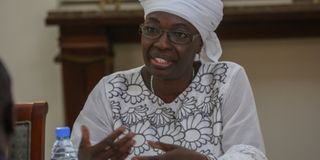AU advisory board moves to strengthen anti-corruption frameworks

The African Union Advisory Board against Corruption Chairperson Seynabou Ndiaye Diakhate. PHOTO | FILE
What you need to know:
- The initiative includes measures to ensure the recovery of stolen assets and illicit funds, returning them to their countries of origin. The issue was a key focus at the 48th Ordinary Session of the AUABC, held here on Wednesday.
Arusha. The African Union Advisory Board against Corruption (AUABC) has launched an initiative to help its 55 member states strengthen legal frameworks in the fight against corruption, particularly in high offices.
The initiative includes measures to ensure the recovery of stolen assets and illicit funds, returning them to their countries of origin. The issue was a key focus at the 48th Ordinary Session of the AUABC, held here on Wednesday.
AUABC Chairperson Seynabou Ndiaye Diakhate said the board has developed a Common Africa Position on Asset Recovery, which outlines strategies for identifying and repatriating stolen assets.
"Last year, we faced serious challenges in the fight against corruption, with negative effects on fiscal administration, illicit financial flows, and economic crimes," Diakhate said.
"This led to the creation of a unified position to ensure stolen funds and assets are returned to their rightful countries."
A recent example of asset recovery came when the United States and Nigeria agreed to repatriate $52.9 million in forfeited corruption proceeds under the Kleptocracy Asset Recovery Initiative, led by the US Department of Justice.
According to a UN report, Africa loses about $88.6 billion annually due to corruption and illicit financial flows, a situation that continues to destabilise economies across the continent.
The AUABC’s meetings serve as platforms for discussing best practices and strategic anti-corruption measures. Delegates at the session noted that corruption not only drains resources but also erodes public trust, weakens democracy, and undermines the rule of law.
Economic pressures, including a rising cost-of-living crisis, have further exacerbated corruption risks in both the public and private sectors. These factors have contributed to what experts describe as the paradox of Africa being a “rich continent with poor citizens.”
Esther Wanjiru Mnaro of the Pan African Lawyers Union (PALU) and Interim President of Non-State Actors Donald Deya highlighted how corruption has forced African nations to rely on foreign loans instead of self-financing their development.
"Without corruption, Africa would not need to borrow for development. The amount lost to corruption equals what countries borrow from abroad," Mnaro said.
She called for stronger anti-corruption enforcement to enable Africa to take its rightful place in the global economy.



